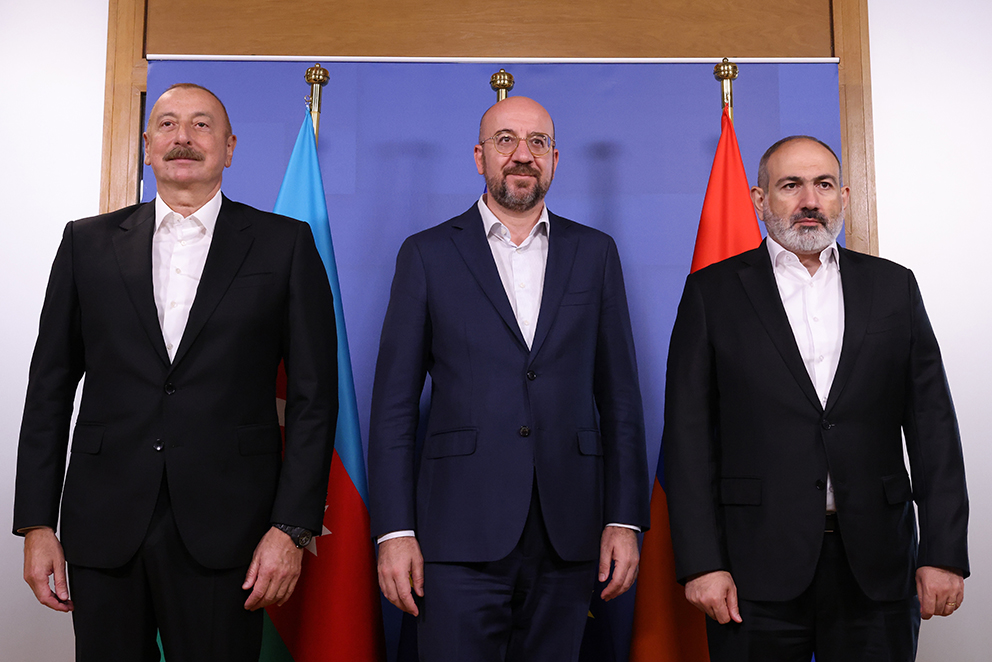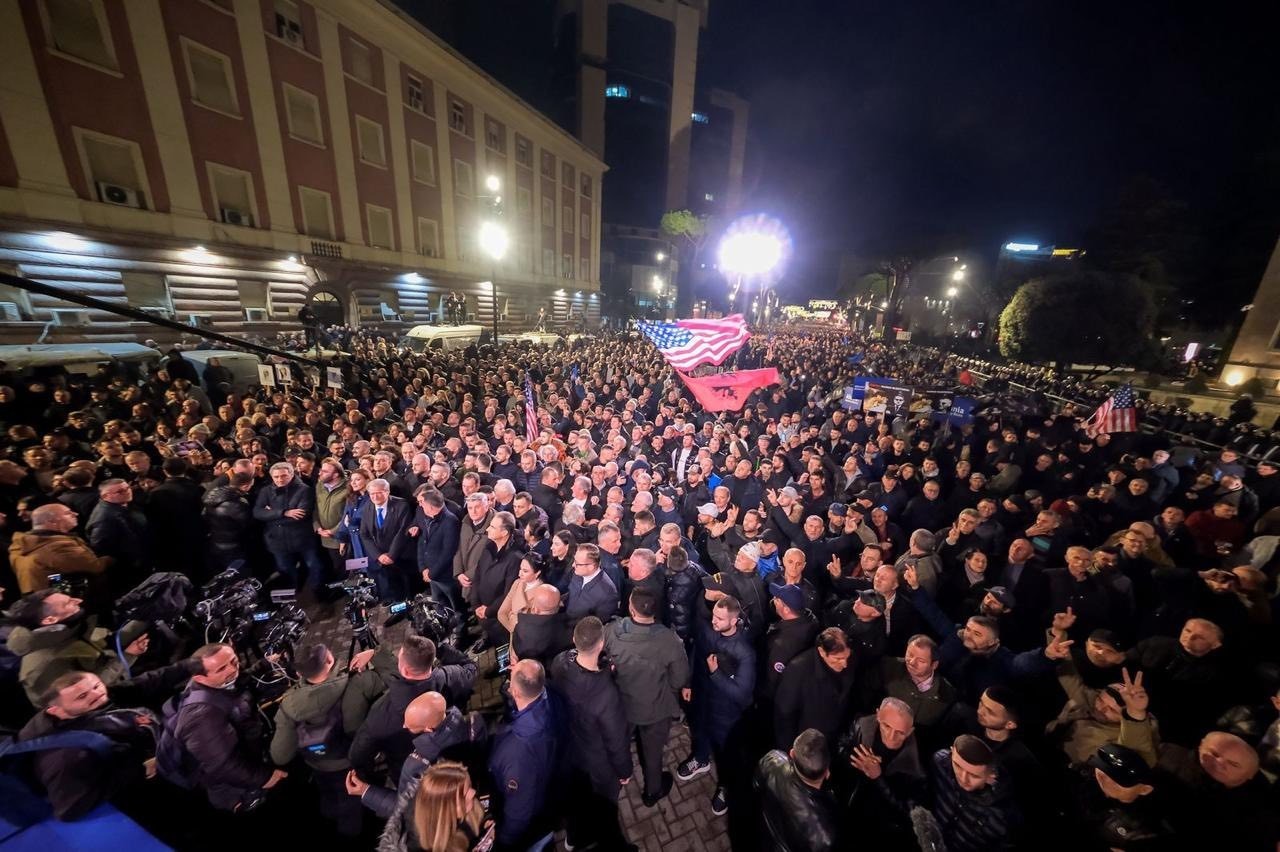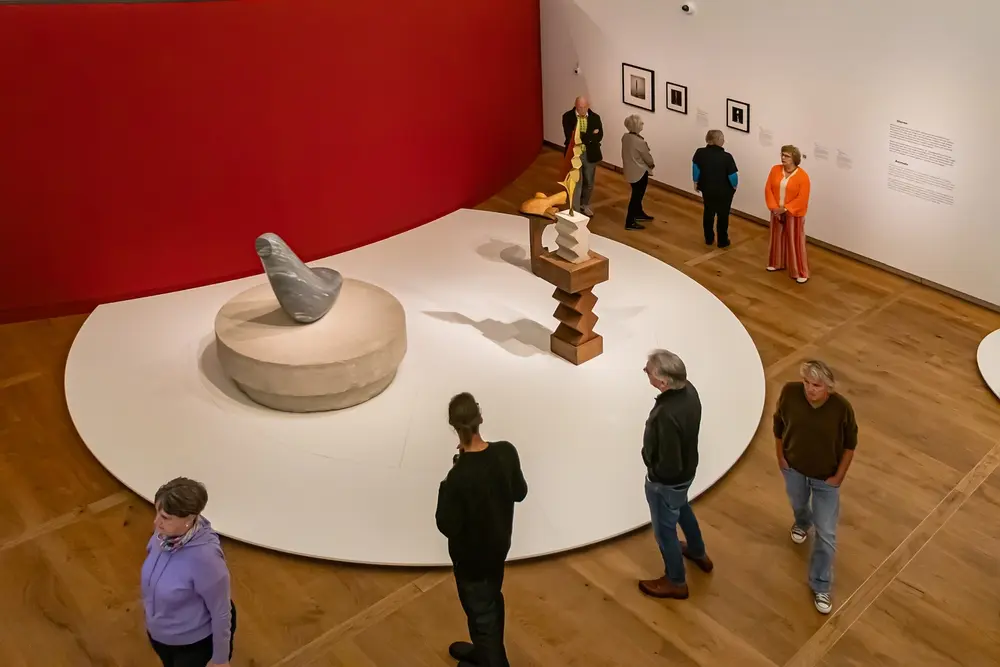Progress and Challenges: Armenian and Azerbaijani Leaders Meet in EU-facilitated Talks in Brussels
Another meeting took place on saturday 15 july among Armenian Prime Minister Nikol Pashinyan and Azerbaijani President Ilham Aliyev, facilitated by European Council President Charles Michel

Progress-and-Challenges-Armenian-and-Azerbaijani-Leaders-Meet-in-EU-facilitated-Talks-in-Brussels
President Michel meets the President of Azerbaijan and the Prime Minister of Armenia (foto © UE)
Armenian Prime Minister Nikol Pashinyan and Azerbaijani President Ilham Aliyev met again on Saturday (15 July) for talks in Brussels facilitated by European Council President Charles Michel. The meeting was the second this year in this format and comes hot on the heels of a U.S.-facilitated talks between the Armenian and Azerbaijani foreign ministers in June as well as new developments on the strategic highway connecting Armenia with what remains of the former Soviet-era Nagorno Karabakh Autonomous Oblast (NKAO).
Prior to the 15th July meeting between the two leaders, there had already been other incidents on the crucial road, referred to for decades as the Lachin Corridor, that has increasingly seen Azerbaijan significantly restrict movement to various degrees at different times. The situation has led to the shortages of imported and some other goods in the besieged breakaway region.
The meeting lasted just 2.5 hours leading many to initially conclude that it had been fruitless. On 11 July, Azerbaijan fully closed its newly established border checkpoint on the entrance of the Lachin highway when checks on vehicles traveling as part of International Committee of the Red Cross (ICRC) humanitarian convoys to Karabakh from Armenia were found to be also transporting some non-humanitarian goods of a commercial nature.
In a statement, ICRC acknowledged that contraband was being smuggled but noted that they were discovered in Heavy Goods Vehicles (HGVs) operated by drivers from a commercial company, albeit temporarily under their emblem, contracted by ICRC to deliver assistance to Karabakh rather than in those official ICRC vehicles accompanying them. “These individuals were not ICRC staff members and their service contracts were immediately terminated by the ICRC,” it said in a statement issued after Baku temporarily suspended ICRC medical evacuations through the checkpoint manned by Azerbaijani border guards as a result.
Azerbaijani foreign minister Jeyhun Bayramov met with the head of the ICRC delegation in Baku a day before the Brussels talks where he noted that humanitarian assistance could instead be transferred to Karabakh from Azerbaijan proper rather than from Armenia. ICRC, the only international organisation with offices in Baku, Yerevan, and Stepanakert, resumed transporting Karabakh patients to and from Armenia the same day. Azerbaijan has increasingly suggested that deliveries should operate under the ICRC in Azerbaijan rather than its office in Armenia.
Indeed, and though much to the alarm of many Armenian analysts, this likelihood was in effect echoed in the public statement made by European Council President Charles Michel following his trilateral meeting with Aliyev and Pashinyan the following day. “I emphasised the need to open the Lachin road,” he said. “I also noted Azerbaijan’s willingness to provide humanitarian supplies via Aghdam. I see both options as important and encourage humanitarian deliveries from both sides […]. I also welcomed the resumption of medical evacuations by the ICRC.”
Though unclear when such a development will occur, it is quite possible that in this scenario medical evacuations would occur via Lachin while humanitarian assistance could enter Karabakh from the adjacent Azerbaijani region. Michel’s words were also likely approved by Aliyev and Pashinyan before they was made, once again reaffirming international recognition of Azerbaijan’s territorial integrity, another point reiterated by Michel who again noted that Yerevan and Baku again recognised each other’s sovereignty over Armenia’s 29,800 and Azerbaijan’s 86,600 square metres of land.
Also of note, Michel again stressed the need for construction of the railroad connecting Azerbaijan to its exclave of Nakhchivan through southern Armenia to start, as stipulated by the November 2020 trilateral ceasefire statement. Failure by the Armenian side to restore the Soviet-era railway has long frustrated efforts to reach a peace agreement and is also considered by some to be the main reason for the impasse on the Lachin Corridor, another provision under the 2020 armistice.
Indeed, Michel again repeated the European Union’s offer to contribute to the construction of what Azerbaijan refers to as “Zangezur Corridor,” an acknowledgement of how both routes are cosidered reciprocal in nature. Other points made by Michel also followed previous statements.
Nonetheless, Michel referred to the meeting as “frank, honest and substantive.” Further, he noted, “[w]e are going through one of the most comprehensive and vigorous stages of negotiations between Armenia and Azerbaijan,” before also stating that the two leaders would not meet in the Brussels format until after the summer ahead of the next European Political Community (EPC) summit set for Granada, Spain, in mid-October. The U.S., however, has already encouraged the Armenian and Azerbaijani foreign ministers to meet in the meantime.
As always, however, one of the most pressing issues of all – the question of the rights and security of the Karabakh Armenians – remains unresolved with reported disagreements over how this will be discussed. Both Yerevan and Stepanakert want international involvement in any talks between Karabakh representatives and official Baku, something Azerbaijan rejects, though an apparently leaked memo from a 27 September 2022 meeting between Aliyev advisor Hikmet Hajiyev and Armenian Security Council Secretary Armen Grigoryan in Washington D.C. appeared to hint that an internationally visible rather than internationally mediated mechanism could be acceptable.
For the de facto Karabakh Armenian leadership, however, such talks on the territory’s likely reintegration into Azerbaijan are unacceptable without the participation of Moscow, as had been the case until March. In June, Stepanakert also turned down U.S. offers to facilitate such talks with Azerbaijan on neutral ground. With no bargaining chips to hand, a day before the 15 July talks in Brussels, the de facto Karabakh authorities instead announced daily rallies in the hope that a peace agreement can be prevented. So far, attendance has been poor and there has been little visible support in Armenia or the diaspora.
However, along with the formal recognition of Azerbaijan’s territorial integrity and the unblocking of regional trade and communications, the issue of the Karabakh Armenians remains a stumbling block though many consider than both the Lachin checkpoint and any change in how ICRC transfers aid to Stepanakert represent the first steps in any integration process. They could also serve as much needed confidence measure, albeit over time.
“The population on the ground needs reassurances, first and foremost regarding their rights and security,” Charles Michel said following last weekend’s meeting. “In this context, I expressed the EU’s encouragement for direct dialogue between Baku and representatives of Armenians living in the former Nagorno-Karabakh Autonomous Oblast. This dialogue should provide much-needed confidence for all those involved.”
Progress and Challenges: Armenian and Azerbaijani Leaders Meet in EU-facilitated Talks in Brussels
Another meeting took place on saturday 15 july among Armenian Prime Minister Nikol Pashinyan and Azerbaijani President Ilham Aliyev, facilitated by European Council President Charles Michel

Progress-and-Challenges-Armenian-and-Azerbaijani-Leaders-Meet-in-EU-facilitated-Talks-in-Brussels
President Michel meets the President of Azerbaijan and the Prime Minister of Armenia (foto © UE)
Armenian Prime Minister Nikol Pashinyan and Azerbaijani President Ilham Aliyev met again on Saturday (15 July) for talks in Brussels facilitated by European Council President Charles Michel. The meeting was the second this year in this format and comes hot on the heels of a U.S.-facilitated talks between the Armenian and Azerbaijani foreign ministers in June as well as new developments on the strategic highway connecting Armenia with what remains of the former Soviet-era Nagorno Karabakh Autonomous Oblast (NKAO).
Prior to the 15th July meeting between the two leaders, there had already been other incidents on the crucial road, referred to for decades as the Lachin Corridor, that has increasingly seen Azerbaijan significantly restrict movement to various degrees at different times. The situation has led to the shortages of imported and some other goods in the besieged breakaway region.
The meeting lasted just 2.5 hours leading many to initially conclude that it had been fruitless. On 11 July, Azerbaijan fully closed its newly established border checkpoint on the entrance of the Lachin highway when checks on vehicles traveling as part of International Committee of the Red Cross (ICRC) humanitarian convoys to Karabakh from Armenia were found to be also transporting some non-humanitarian goods of a commercial nature.
In a statement, ICRC acknowledged that contraband was being smuggled but noted that they were discovered in Heavy Goods Vehicles (HGVs) operated by drivers from a commercial company, albeit temporarily under their emblem, contracted by ICRC to deliver assistance to Karabakh rather than in those official ICRC vehicles accompanying them. “These individuals were not ICRC staff members and their service contracts were immediately terminated by the ICRC,” it said in a statement issued after Baku temporarily suspended ICRC medical evacuations through the checkpoint manned by Azerbaijani border guards as a result.
Azerbaijani foreign minister Jeyhun Bayramov met with the head of the ICRC delegation in Baku a day before the Brussels talks where he noted that humanitarian assistance could instead be transferred to Karabakh from Azerbaijan proper rather than from Armenia. ICRC, the only international organisation with offices in Baku, Yerevan, and Stepanakert, resumed transporting Karabakh patients to and from Armenia the same day. Azerbaijan has increasingly suggested that deliveries should operate under the ICRC in Azerbaijan rather than its office in Armenia.
Indeed, and though much to the alarm of many Armenian analysts, this likelihood was in effect echoed in the public statement made by European Council President Charles Michel following his trilateral meeting with Aliyev and Pashinyan the following day. “I emphasised the need to open the Lachin road,” he said. “I also noted Azerbaijan’s willingness to provide humanitarian supplies via Aghdam. I see both options as important and encourage humanitarian deliveries from both sides […]. I also welcomed the resumption of medical evacuations by the ICRC.”
Though unclear when such a development will occur, it is quite possible that in this scenario medical evacuations would occur via Lachin while humanitarian assistance could enter Karabakh from the adjacent Azerbaijani region. Michel’s words were also likely approved by Aliyev and Pashinyan before they was made, once again reaffirming international recognition of Azerbaijan’s territorial integrity, another point reiterated by Michel who again noted that Yerevan and Baku again recognised each other’s sovereignty over Armenia’s 29,800 and Azerbaijan’s 86,600 square metres of land.
Also of note, Michel again stressed the need for construction of the railroad connecting Azerbaijan to its exclave of Nakhchivan through southern Armenia to start, as stipulated by the November 2020 trilateral ceasefire statement. Failure by the Armenian side to restore the Soviet-era railway has long frustrated efforts to reach a peace agreement and is also considered by some to be the main reason for the impasse on the Lachin Corridor, another provision under the 2020 armistice.
Indeed, Michel again repeated the European Union’s offer to contribute to the construction of what Azerbaijan refers to as “Zangezur Corridor,” an acknowledgement of how both routes are cosidered reciprocal in nature. Other points made by Michel also followed previous statements.
Nonetheless, Michel referred to the meeting as “frank, honest and substantive.” Further, he noted, “[w]e are going through one of the most comprehensive and vigorous stages of negotiations between Armenia and Azerbaijan,” before also stating that the two leaders would not meet in the Brussels format until after the summer ahead of the next European Political Community (EPC) summit set for Granada, Spain, in mid-October. The U.S., however, has already encouraged the Armenian and Azerbaijani foreign ministers to meet in the meantime.
As always, however, one of the most pressing issues of all – the question of the rights and security of the Karabakh Armenians – remains unresolved with reported disagreements over how this will be discussed. Both Yerevan and Stepanakert want international involvement in any talks between Karabakh representatives and official Baku, something Azerbaijan rejects, though an apparently leaked memo from a 27 September 2022 meeting between Aliyev advisor Hikmet Hajiyev and Armenian Security Council Secretary Armen Grigoryan in Washington D.C. appeared to hint that an internationally visible rather than internationally mediated mechanism could be acceptable.
For the de facto Karabakh Armenian leadership, however, such talks on the territory’s likely reintegration into Azerbaijan are unacceptable without the participation of Moscow, as had been the case until March. In June, Stepanakert also turned down U.S. offers to facilitate such talks with Azerbaijan on neutral ground. With no bargaining chips to hand, a day before the 15 July talks in Brussels, the de facto Karabakh authorities instead announced daily rallies in the hope that a peace agreement can be prevented. So far, attendance has been poor and there has been little visible support in Armenia or the diaspora.
However, along with the formal recognition of Azerbaijan’s territorial integrity and the unblocking of regional trade and communications, the issue of the Karabakh Armenians remains a stumbling block though many consider than both the Lachin checkpoint and any change in how ICRC transfers aid to Stepanakert represent the first steps in any integration process. They could also serve as much needed confidence measure, albeit over time.
“The population on the ground needs reassurances, first and foremost regarding their rights and security,” Charles Michel said following last weekend’s meeting. “In this context, I expressed the EU’s encouragement for direct dialogue between Baku and representatives of Armenians living in the former Nagorno-Karabakh Autonomous Oblast. This dialogue should provide much-needed confidence for all those involved.”









